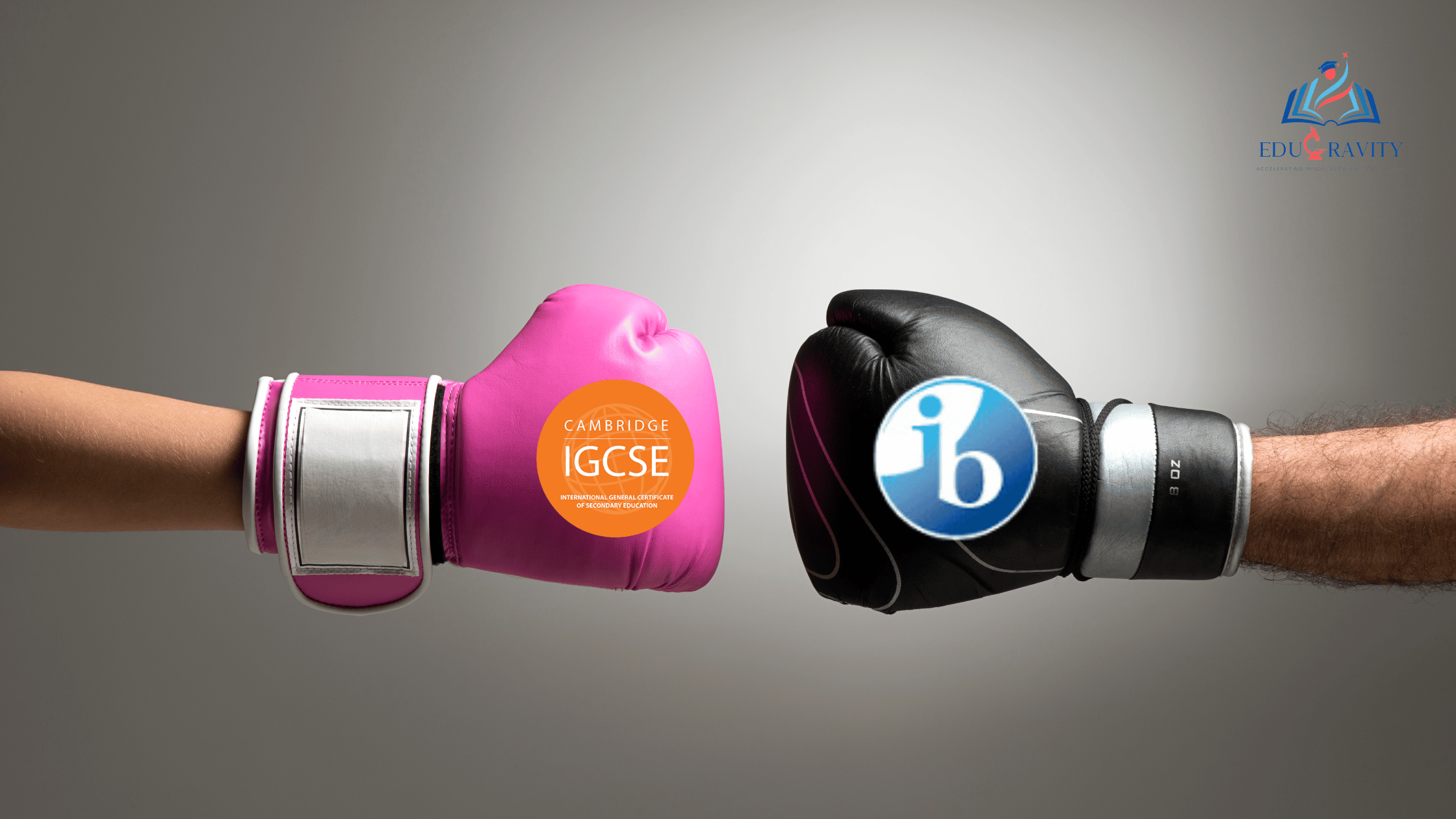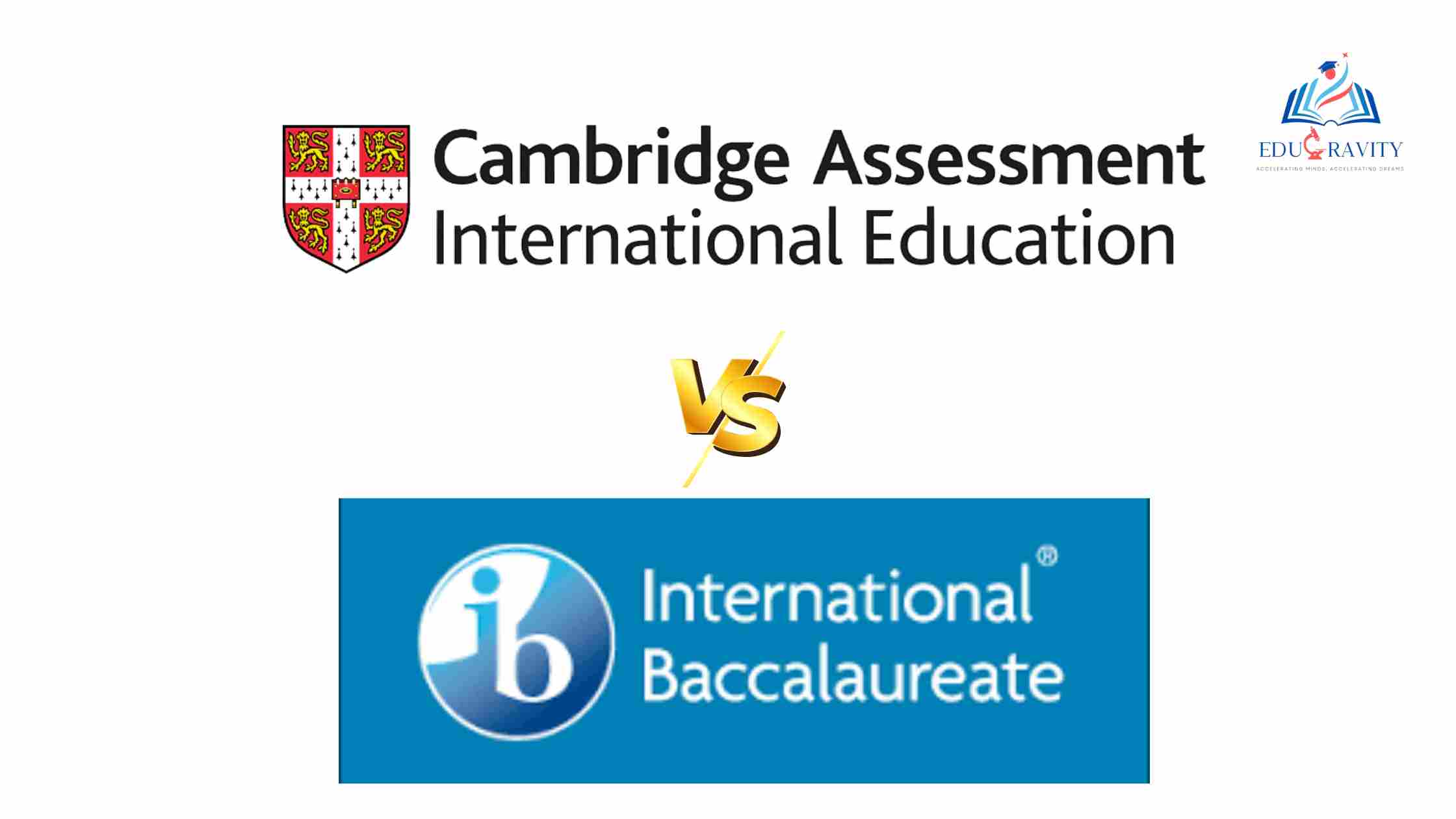IGCSE vs IB



Difference Between IGCSE and IB
Education plays a crucial role in shaping a student’s future, and choosing the right path can be overwhelming. For students and parents looking at international education programs, two popular options stand out: IGCSE (International General Certificate of Secondary Education) and IB (International Baccalaureate). Understanding the key differences between IB vs IGCSE programs is essential for making the right decision.
What is IGCSE?
History and Overview of IGCSE
The IGCSE was developed by the University of Cambridge and is a globally recognized program. Introduced in 1988, it caters to students aged 14 to 16 and is similar to the UK’s GCSE. IGCSE is popular because it provides a strong foundation for higher education, especially for students interested in pursuing further qualifications like A-levels.
Structure and Curriculum of IGCSE
The IGCSE program is quite flexible, allowing students to choose from over 70 subjects. It covers core subjects such as English, Math, and Science, but students can also explore options like foreign languages, economics, and art. The curriculum is designed to be internationally adaptable, so it doesn’t focus on any single country’s education system.
Subjects Offered in IGCSE
IGCSE offers a broad range of subjects. Students must take mandatory subjects like English and Math but can also select optional subjects, making it a customizable program based on a student’s interests and strengths.
Grading System in IGCSE
IGCSE uses a grading system that ranges from A* (the highest) to G (the lowest). Some schools also offer a 9–1 grading scale, where 9 is equivalent to A*. This system is straightforward and familiar to those who follow the British curriculum.
What is IB?
History and Overview of IB
The International Baccalaureate (IB) was founded in 1968 in Switzerland to provide a more holistic and internationally focused education. The IB curriculum is designed to develop critical thinking, global awareness, and independent research skills.
Structure and Curriculum of IB
IB is divided into four programs: PYP (Primary Years Program), MYP (Middle Years Program), DP (Diploma Program), and CP (Career-related Program). The most commonly recognized is the DP, which is aimed at students aged 16 to 19. IB requires students to take a mix of subjects from six groups, including Language, Science, Mathematics, and Humanities.
Subjects Offered in IB
IB offers a balanced curriculum that includes six subject groups: Language and Literature, Language Acquisition, Individuals and Societies, Sciences, Mathematics, and The Arts. Students must select one subject from each group and complete three core components: Theory of Knowledge (TOK), Extended Essay (EE), and Creativity, Activity, and Service (CAS).
Grading System in IB
IB is graded on a 1 to 7 scale, with 7 being the highest. To earn the IB Diploma, students need a minimum of 24 points out of a possible 45. The grading takes into account both external exams and internal assessments, along with the completion of core components like the Extended Essay.
IGCSE vs IB : Key Differences
- Curriculum Approach
The IGCSE focuses more on knowledge acquisition and subject mastery, while IB emphasizes a more holistic approach, including the development of critical thinking and global awareness.
- Focus on Skills vs Knowledge
IGCSE prioritizes subject knowledge and depth, making it ideal for students aiming to specialize in specific areas. On the other hand, IB encourages a broader understanding across multiple disciplines and is skills-focused.
- Flexibility and Subject Choices
Both programs offer a range of subjects, but IGCSE offers more flexibility in subject combinations, while IB has a more structured program, requiring students to cover subjects from six different groups.
- Global Recognition
Both IGCSE and IB are highly regarded globally. However, IB is considered more prestigious due to its comprehensive curriculum and rigorous assessment methods. Universities worldwide recognize both qualifications, but IB may have an edge for competitive admissions.
Which is Better: IGCSE or IB?
Suitability Based on Student Preferences
For students who prefer in-depth study in specific subjects, IGCSE may be the better option. IB, however, is perfect for those who enjoy a broad range of subjects and are interested in developing well-rounded skills.
Which is More Challenging?
IB is often seen as more challenging because of its rigorous assessment methods and the requirement to complete core components like the Extended Essay. IGCSE, while demanding, allows students to focus more narrowly on their strengths.
Preparation for Higher Education
Both IGCSE and IB prepare students for higher education, but IB is more thorough in developing the research, critical thinking, and time management skills that universities highly value.
Conclusion
Both IGCSE and IB offer unique advantages, and the right choice depends on a student’s learning style and academic goals. IGCSE is more suited for those who want to specialize in specific subjects, while IB is perfect for students seeking a well-rounded education that develops critical thinking and global awareness. No matter which path you choose, Edugravity is here to support you with personalized, expert tuition for both IGCSE and IB students.
How Edugravity Supports IGCSE and IB Students?
- Expert Tutors for Both Programs
At Edugravity, we provide expert tutors in UAE specializing in both IGCSE and IB curricula. Our tutors understand the nuances of each program and tailor their teaching methods to meet students’ unique needs.
- Personalized Learning Plans
Edugravity offers personalized learning plans that help students excel in their chosen programs, ensuring they grasp core concepts and excel in assessments.
- Flexibility with Online Tuition
Edugravity’s online tuition services allow students to learn at their own pace, offering flexible scheduling options to fit their busy lives.
- Achieving Success with Edugravity
Whether you’re aiming to excel in IGCSE or IB, Edugravity has the resources and expertise to help students achieve their academic goals.
FAQs
Q: Can you switch from IGCSE to IB or vice versa?
Yes, it is possible to switch between the two programs, but it’s essential to consider the differences in curriculum and assessment before making a decision.
Q: Is IB more difficult than IGCSE?
While both programs are challenging, IB is often considered more demanding due to its broader curriculum and additional core components like the Extended Essay.
Q: How is the grading in IB different from IGCSE?
IB uses a 1–7 scale, whereas IGCSE typically follows an A* to G or 9–1 grading system, depending on the school.
Q: Is IGCSE or IB better for university applications?
Both qualifications are well-regarded by universities, but IB may be preferred for its holistic approach and rigorous academic standards.
Q: How can Edugravity help in preparing for both IGCSE and IB?
Edugravity provides expert online tuition service, personalized learning plans, and flexible schedules to help students excel in both IGCSE and IB programs.
The **difference between IGCSE and IB** can be seen in their approach to learning. While **IGCSE and IB** both aim to prepare students for higher education, the **IB vs IGCSE** comparison highlights that the **international baccalaureate vs IGCSE** programs differ in their depth and breadth. The **IGCSE and IB difference** is also evident in their global recognition, with **IB and IGCSE** being accepted by universities worldwide. However, the **IB and IGCSE difference** lies in how they assess students, with **IB IGCSE** programs having distinct evaluation criteria.
When exploring **IB vs IGCSE**, it’s clear that the **difference between IB and IGCSE** extends to subject choices and flexibility. The **IGCSE vs IB** debate often centers on whether students prefer the structured approach of the **international baccalaureate vs IGCSE** or the more customizable nature of the **IGCSE and IB**. The **IB and IGCSE difference** also includes the level of difficulty, with **IB IGCSE** programs catering to different academic strengths.
In conclusion, the **difference between IGCSE and IB** is significant, and understanding the **IB vs IGCSE** distinction is crucial for making an informed decision. Whether you’re comparing **IGCSE vs IB** or analyzing the **international baccalaureate vs IGCSE**, it’s important to consider the **IGCSE and IB difference** in terms of curriculum, assessment, and global recognition. The **IB and IGCSE difference** ultimately comes down to personal preferences and academic goals, making the **IB IGCSE** choice a highly individual one.





